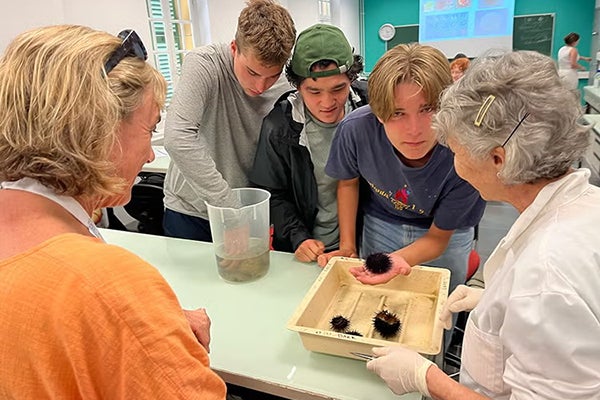Extending a Welcome Mat for Scientific, Mathematical Talent
To advance a sense of belonging, while addressing challenges that disproportionately occur for women and people from underrepresented groups, a number of initiatives are underway.

In recent weeks, a pair of researchers received two of the biggest prizes in science, the Breakthrough Prize and the Lasker Award. Both women seized the moment to shine a light on something too frequently cast into the shadows—namely that STEM fields need more women and people from underrepresented communities involved and made welcome in their pursuits.
First, astrophysicist Jocelyn Bell Burnell, who discovered radio pulsars but saw the 1974 Nobel Prize awarded to her male supervisor instead, announced that she would donate her $3 million Breakthrough Prize to programs to increase diversity in the physical sciences. Then Yale geneticist Joan Steitz won the Lasker Award and was recognized for leadership in eliminating barriers for women in science. Both esteemed researchers helped send a message that's backed by data: impactful science, math and computing is linked to having people from a variety of backgrounds involved.
In the College of Natural Sciences, multiple units in recent years have aimed to approach diversity and inclusion initiatives more thoughtfully and effectively so that every talented contributor in the college feels welcome. It's a process that takes time and that, by all accounts, will necessitate more work. Still, acknowledging the need to start somewhere, various parts of the college have embarked on new initiatives—from working to ensure faculty better reflect the diversity of the students they teach, to providing professional development for support staff in addressing unrecognized biases, to providing access to on-campus training initiatives for students and employees.
In each case the goal is to advance a sense of belonging, while addressing challenges that disproportionately occur for women and people from underrepresented groups. For example, in recent years, a series of surveys of master's and Ph.D. students revealed that, in graduate education, some programs were not perceived as inclusive for everyone. In one survey, circulated by graduate students in the Department of Integrative Biology, some students described negative comments and encounters related to their identity.
The department's chair Claus Wilke brought that data and the concerns graduate students expressed directly to faculty. He worked with them to develop an action plan to improve climate department-wide.
"Students were proactive agents of the changes that are underway in our department—they voiced concerns to the chair, who took those concerns seriously," said graduate advisor Professor Molly Cummings. "I hope all students will be on the lookout and voice concerns, discuss issues and be models of change for our future."
A number of ongoing efforts are forging a path forward for other parts of the college, as well:
- The Office of Strategy and Planning is embarking on a new round of climate surveys, similar to the survey that circulated in Integrative Biology, to help identify concerns college-wide. The college's new dean Paul Goldbart called for them after emphasizing the importance of climate issues in his first message of the semester to all faculty, staff and graduate students.
- The CNS Offices of Graduate Education and Undergraduate Education have enacted a series of diversity and inclusivity efforts, including teaming with the Cockrell School of Engineering on a "bias busters" initiative, which offers faculty, staff and students training designed to encourage more inclusive attitudes in STEM.
- The Office of Faculty Affairs now has faculty search committee members undergoing training on inclusive hiring techniques, avoiding bias in interviewing and screening processes and ensuring appropriate diversity in applicant pools.
- The Office of Undergraduate Education implemented college-wide professional development related to inclusion and diversity issues for all advisors and support staff. There's also a new Diversity, Equity, and Inclusivity Concentration available to CNS undergraduate students; the inaugural introductory course, NSC 109 Civil Discourse, is being taught to 35 CNS majors this semester by Melissa Taylor, the college's assistant dean for strategy and planning.
-
All of this occurs against a backdrop of a changing college. Many undergraduate majors and graduate programs have seen sharp increases in the number of female students and students of color. College-wide, nearly six out of 10 undergraduates now are women. Meanwhile, reflecting the increasing demographic diversity of Texas as a whole, the proportion of students coming from underrepresented racial and ethnic groups also is on the rise.
The faculty in many departments are still predominately white and male, but more members of this group are acknowledging they have a role to play in improving climate. Professor of integrative biology Mike Ryan, for example, circulated a call to action this summer signed by 25 distinguished biologists in a field that had been rocked by sexual harassment. The letter urged scientists, especially men, "to speak out when we see misconduct, to listen to and amplify female colleagues when they express discomfort, to support and mentor female students, and to set a professional and respectful tone in conversations with peers and students of any gender."
Goldbart has enlisted former associate dean for faculty affairs Shelley Payne to serve as a special advisor on issues of diversity and inclusion in the college. In her new role, she'll support implementation of change efforts occurring throughout the college and work closely with administrators in graduate education, faculty affairs, undergraduate education and departments to ensure the best laid plans are enacted effectively.
"Diversity and inclusion are critically important for our effectiveness in research and in teaching. Work remains, but we have started to see real progress in Natural Sciences," Payne said. "That's been driven not only from the top-down but from the bottom-up, thanks to involvement from faculty, staff and students who care about this and who understand its importance."



